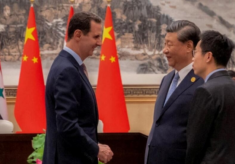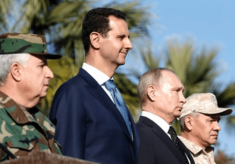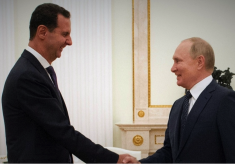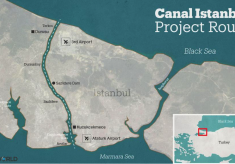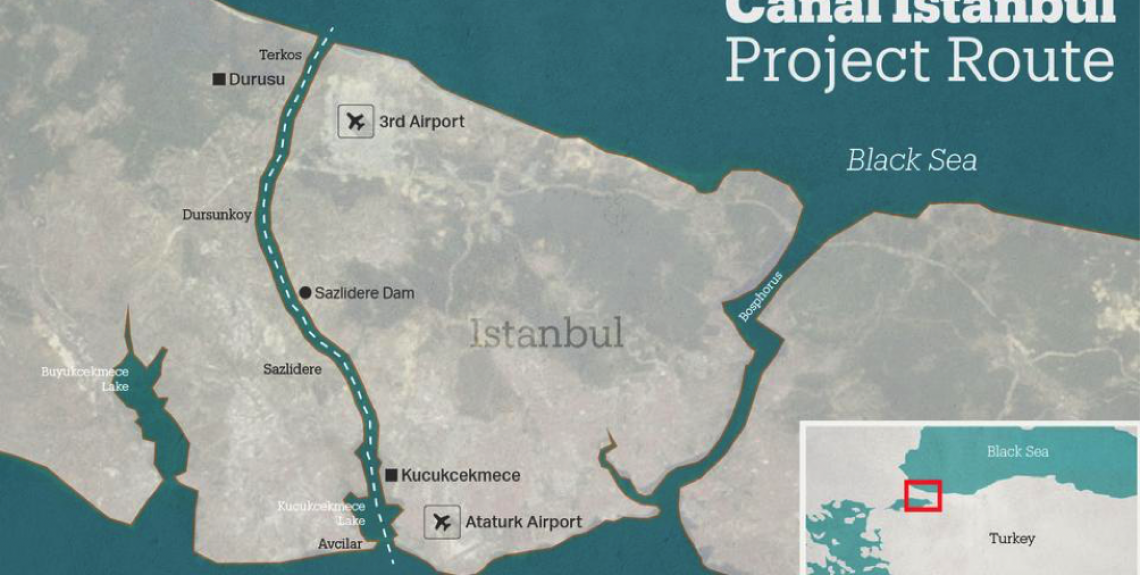In early March, Turkish President Recep Tayyip Erdoğan announced that Ankara will very soon call for bids on the construction of the Canal Istanbul, stressing that “this project will have an exponential impact on Turkey’s strategic strength” [Alyanak, Çiğdem Münibe; Mutlu, Sefa; Paksoy, Murat; Orkan, Semra; Rakipoğlu, Zeynep: “Cumhurbaşkanı Erdoğan: Kanal İstanbul Projesi en yakın zamanda ihaleye çıkıyor” AA, March 8, 2020]. The Canal Istanbul is a 45 km long artificial sea channel that is ought to connect the Black Sea with the Dardanelles and reduce to a viable quantity the shipping movement in the Bosphorus. The nationally disputed “crazy project” is indeed the most ambitious among all the infrastructural projects his government implemented. However, while nationally and internationally the focus lies on the environmental impact the Canal Istanbul would have, the geopolitical implications are already ringing alarm bells in riparian states to the Black Sea.
The Turkish Straits include the Dardanelles, the Bosphorus and the Marmara Sea connecting the Mediterranean and the Aegean Seas to the bordering states of the Black Sea, among them Russia and Ukraine. Being the south-eastern frontier of Europe and the Euro Atlantic Community, the Black Sea is geo-strategically pivotal.
Boris Toucas, visiting fellow with the Europe Program at the Center for Strategic and International Studies (CSIS), underlined the Black Sea’s geostrategic significance for Russia: “Crimea is the military source, Turkey is the pivot, and the Turkish Straits are the strategic throughput; and the end goal is access to and military presence in the Eastern Mediterranean as a counterbalance to U.S. and NATO expansion eastward and its presence in the Aegean and Central Mediterranean” [Toucas, Boris: The Geostrategic Importance of the Black Sea Region: A Brief History, CSIS, February 2, 2017]. Russia fears that Ankara could denounce the Montreux Treaty which would pose a severe security threat to Moscow’s interests.
The Treaty signed in 1936 restricts the passage of naval vessels not belonging to the Black Sea littoral states because they must be under 15.000 tons per vessel, 45.000 in aggregate, and could only stay in the Black Sea for 21 days. Moscow’s main concern is that NATO could expand and deploy military vessels into the Black Sea which it considers to be its natural area of influence.
In fact, the Turkish aim are realist geopolitics: this canal means that Ankara raises its geopolitical leverage vis-à-vis the international community by having an exclusive authority over this geo-strategically pivotal straight.
According the Turkish nationalist segment of the political spectrum, the current status quo is considered a “second Treaty of Sèvres” (the Turkish equivalent of the Middle Eastern Sykes-Picot agreement): a direct reference to the treaty dividing Turkey among colonial powers that was imposed upon the Ottoman Empire after its defeat in World War One.
Following the successful war of independence led by Kemal Mustafa Atatürk, the Treaty of Sévres was annulled and superseded by the 1923 Treaty of Lausanne. The 1936 Montreux Convention was one result of the Lausanne Treaty, establishing Turkish control over the straits. While in Turkish collective memory the Montreux Convention is comparatively considered to be more advantageous, it still deprives 21st century Turkey of its natural sovereign rights to national rule over its sea lanes. Hence, the Montreux Convention is considered to be incompatible with Turkey’s aspiration to supremacy as a regional power that seeks a place among global powers.
Since Ankara has not the might and international leverage to set the scene for negotiating a new status quo over Montreux, it aims at bypassing this debate by confronting the international community with a fait accompli by the construction of the Canal Istanbul.
Notwithstanding these aspirations, there is consensus for the need to maintain stability through the Montreux Convention. It is not in Turkey’s interest to trigger an arms race in the Black Sea region since this would harm its own security by causing a strife with Russia and, by extension, with China.
China, Russia’s biggest ally, is also expanding its maritime presence through a network of ports and military bases as part of its “Belt and Road Initiative.” As China is keen to regulate the passage of warships and tighten its control over the strategic maritime passage to the South China Sea, it monitors the Black Sea with particular interest. The abolition of the Montreux Convention will not be in China’s interest either.
Applying the Montreux Convention to the new canal would mean amending the convention, a difficult legal process with its own ramifications. Even though partially Russia’s defense and security would be jeopardised by the construction of the canal, this is not primarily about military deterrence but about settling an old score from the First World War.
